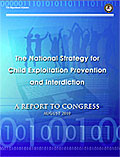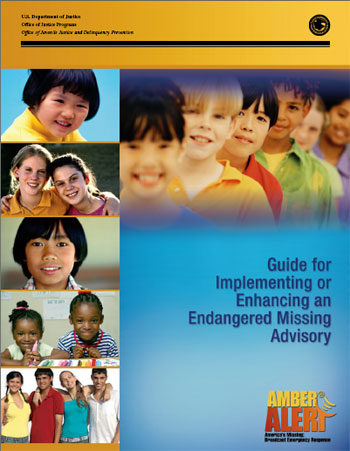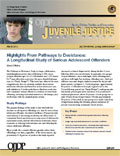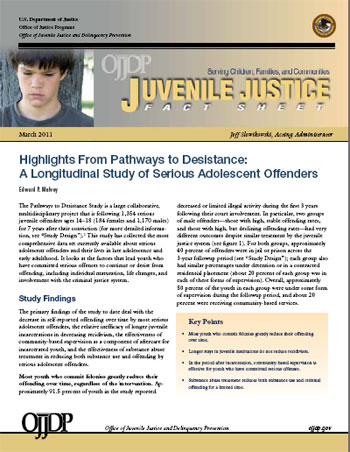

Image source: A&E Web site
A study by Anthony Petrosino and researchers at the Campbell Collaboration analyzed results from nine Scared Straight programs and found that such programs generally increased crime up to 28 percent in the experimental group when compared to a no-treatment control group. In another analysis of juvenile prevention and treatment programs, Mark Lipsey of the Vanderbilt Institute for Public Policy Studies found that youth who participate in Scared Straight and other similar deterrence programs have higher recidivism rates than youth in control groups.1 And a report presented in 1997 to the U.S. Congress reviewed more than 500 crime prevention evaluations and placed Scared Straight programs in the "what does not work" category. Despite these findings, Scared Straight programs continue to be used throughout the United States and abroad.
On January 13, 2011, A&E Television Networks aired the first of a multiepisode series of reality shows called "Beyond Scared Straight." The original, award-winning documentary, "Scared Straight," aired in 1978. The A&E series elicited a strong response from the juvenile justice field and the U.S. Department of Justice. In an op-ed piece published January 31, 2011, in The Baltimore Sun, Assistant Attorney General for the Office of Justice Programs Laurie O. Robinson and the Office of Juvenile Justice and Delinquency Prevention's Acting Administrator Jeff Slowikowski discussed how the use of Scared Straight programs to prevent delinquency is ineffective and can harm youth.
—Laurie Robinson, Assistant Attorney General for the Office of Justice Programs
—Jeff Slowikowski, Acting Administrator, OJJDP
Citing the findings of the Campbell Collaboration study, Robinson and Slowikowski emphasized that the U.S. Department of Justice does not support Scared Straight-style programs, and instead focuses on programs that research has proven effective, such as mentoring programs, which use positive relationships to modify youth's behavior. "The fact that [Scared Straight] programs are still being touted as effective, despite stark evidence to the contrary is troubling," they wrote. The op-ed piece was picked up by 165 media outlets throughout the country. Of the three states whose programs were featured in the "Beyond Scared Straight" series, two—Maryland and California—suspended their programs in January.
The Juvenile Justice and Delinquency Prevention Act of 1974, as amended, prohibits court-involved youth from being detained, confined, or otherwise having contact with adult inmates in jails and prisons. In keeping with the Act, and supported by research, OJJDP does not fund Scared Straight programs, and cites such programs as potential violations of federal law.
"It is understandable why desperate parents hoping to divert their troubled children from further misbehavior would place their hopes in a program they see touted as effective on TV, and why in years past policymakers opted to fund what appeared to be an easy fix for juvenile offending," wrote Robinson and Slowikowski. "However, we have a responsibility—as both policymakers and parents—to follow evidence, not anecdote, in finding answers, especially when it comes to our children."
1 Lipsey, M.W. 1992. Juvenile Delinquency Treatment: A Meta-Analytic Inquiry into the Variability of Effects. In Meta-Analysis for Explanation: A Casebook, edited by T.D. Cook, H. Cooper, D.S. Cordray, H. Hartmann, L.V. Hedges, R.J. Light, T.A. Louis, and F. Mosteller. New York: Russell Sage Foundation.

The challenge of protecting children has been made significantly more complex by ready access to the Internet. Parents, child protection agencies, and law enforcement are struggling to protect children from the threat of online victimization, which can include pornography, cyberbullying, abduction, sexual abuse, and child prostitution.
OJJDP took the lead early on in addressing this serious problem. More than a decade ago, the Office established the Internet Crimes Against Children (ICAC) task force program, which helps state and local law enforcement agencies prevent, interdict, and investigate technology-facilitated child sexual exploitation and Internet crimes against children. The 61 ICAC task forces use aggressive investigations, prosecutions, computer forensics, and community outreach to address cybercrime. By helping state and local law enforcement agencies develop effective and sustainable responses to online child victimization and child pornography, OJJDP and the ICAC program have built capacity at the local level to address related offenses.
In addition to ICAC, the Office supports a wide range of programs that promote evidence-based strategies to protect children against abuse, neglect, abduction, commercial sexual exploitation, and exposure to community and domestic violence.
 In August 2010, the U.S. Department of Justice (DOJ) released the National Strategy Conference on Combating Child Exploitation, in San Jose, CA. For more information, see the Upcoming Events section in the issue.
In August 2010, the U.S. Department of Justice (DOJ) released the National Strategy Conference on Combating Child Exploitation, in San Jose, CA. For more information, see the Upcoming Events section in the issue.
 In September 2010, Attorney General Eric Holder announced Safe Start Center, OJJDP's national resource center for information and training related to reducing children's exposure to violence. Training expanded in 2011 to include a conference in January organized by the center to train multisector "teams" from communities across the country on the most effective collaborative strategies for reducing children's exposure to violence.
In September 2010, Attorney General Eric Holder announced Safe Start Center, OJJDP's national resource center for information and training related to reducing children's exposure to violence. Training expanded in 2011 to include a conference in January organized by the center to train multisector "teams" from communities across the country on the most effective collaborative strategies for reducing children's exposure to violence.
OJJDP's Children's Advocacy Centers (CACs) help coordinate the investigation and prosecution of child abuse cases as well as treatment of the victims. Recognizing that child abuse is a multifaceted problem, CACs involve multidisciplinary teams of professionals—from child protective and victim advocacy services, medical and mental health agencies, and law enforcement and prosecution—who provide a continuum of services to victims and nonoffending family members. Currently, there are more than 700 CACs across the United States. These programs provided comprehensive intervention and treatment services to more than 270,000 children last year. Remarkably, they also provided child abuse prevention education to more than 500,000 children and adults during the same period. They are a valuable resource for community awareness regarding child abuse issues.
CACs have revolutionized the response to child sexual abuse in the United States and numerous foreign countries. Key research findings indicate that CAC cases have shorter investigative periods and higher rates of substantiation than non-CAC cases, shorten the length of time to disposition of child abuse cases, and increase referral rates and service provision of medical and mental healthcare to child victims.
The 27th National Symposium on Child Abuse in Huntsville, AL, on March 28–31, 2011.
Following are just a few examples of other ways OJJDP is working vigorously with communities, law enforcement, and social service agencies to ensure the safety and well-being of our nation's children:
- In its role as a national clearinghouse and resource center, the OJJDP-supported National Center for Missing & Exploited Children (NCMEC) offers critical intervention and prevention services to families and has supported law enforcement agencies at the federal, state, and local levels in cases involving missing and exploited children. NCMEC has assisted in the recovery of nearly 158,000 children.
- With the support of OJJDP, DOJ's Office of Justice Programs manages the AMBER Alert program, which issues media alerts on radio, television, highway signs, wireless devices such as mobile phones, and over the Internet when a law enforcement agency determines that a child has been abducted and is in imminent danger. The AMBER Alert program had helped recover 532 abducted children nationwide.
- Developed, managed, and guided by the National Council of Juvenile and Family Court Judges with funding from OJJDP, the Model Courts program is a network of juvenile and family courts in 34 states, one tribe (the Gila River Indian Community), and the District of Columbia that collaborate to reduce the number of, and achieve better outcomes for, foster children by improving dependency court practice through judicially led system reform.
- OJJDP funds the Web site.
Resources:
Visit the National Criminal Justice Reference Service and the U.S. Department of Health and Human Services' National Child Abuse Prevention Month Web site to find the latest resources and outreach materials on engaging communities in the prevention of child abuse.
 In FY 2010, OJJDP awarded a 3-year, $1.5-million grant to the National Council on Crime and Delinquency to establish the National Girls Institute (NGI). The Institute will provide training and technical assistance to programs that address the needs of girls involved in the juvenile justice system. NGI will also disseminate information; collaborate with researchers and program developers; form partnerships with federal, state, tribal, and local agencies; and develop policy.
In FY 2010, OJJDP awarded a 3-year, $1.5-million grant to the National Council on Crime and Delinquency to establish the National Girls Institute (NGI). The Institute will provide training and technical assistance to programs that address the needs of girls involved in the juvenile justice system. NGI will also disseminate information; collaborate with researchers and program developers; form partnerships with federal, state, tribal, and local agencies; and develop policy.
During its initial grant year, NGI will create an advisory group composed of nationally recognized experts, including tribal experts; launch an NGI Web site; and conduct a nationwide assessment of the current training, technical assistance, and information needs of state, tribal, and local entities serving at-risk and delinquent girls. The assessment process will be carried out through approximately 25 listening sessions throughout the country in urban, suburban, rural, and tribal areas.
NGI held its first listening session on March 3, 2011, in Washington, DC. Facilitated by NGI's Lawanda Ravoira and Vanessa Patino Lydia, and the Rebecca Project for Human Rights' Shakira Washington, the session covered the following topics:
- Trauma (e.g., sexual abuse, sexual exploitation, and child abuse and neglect) and its role in girls' subsequent substance abuse and homelessness; and the need for gender-responsive and trauma-informed services for girls in every facet of juvenile justice (prevention, intervention, reentry).
- Systemic failures to address trauma (e.g., a lack of counseling services, of early intervention in schools, and of timely and/or effective intervention on the part of child welfare agencies and law enforcement); and the need for agencies across the spectrum—juvenile justice, child welfare, education, law enforcement, advocacy groups, and community organizations—to work collaboratively.
- The need to document through evidence-based research which gender-specific programs are of real help to girls. Participants identified the upcoming OJJDP National Conference in October 2011 as an important forum to address this issue.
The findings of the listening sessions will ground the development of programs and policies in the second and third years of the OJJDP grant. "The first listening session reinforced the important role young women must play in developing our collective knowledge and understanding," said Catherine Pierce, Associate Administrator for OJJDP's Child Protection Division. "It is so important for us to listen to girls across the nation and to include girls as partners in the work of NGI."

OJJDP will hold its National Conference, "Children's Justice & Safety: Unite, Build, Lead," at the Gaylord Hotel & Conference Center in National Harbor, MD, on October 12–14, 2011.
More than 2,000 juvenile justice practitioners; educators; community and faith-based leaders; federal, state, tribal, and local officials and representatives; law enforcement professionals; policymakers; researchers; and parents and youth are expected to attend. The conference will feature workshops, plenaries, and presentations on current trends and concerns in delinquency prevention, juvenile justice, and victimization as well as the latest information on evidence-based practices and outcomes.
Conference tracks for October 12–14 include—
- Children's exposure to violence.
- Comprehensive anti-gang strategies and programs.
- Crimes against children.
- Disproportionate minority contact.
- Girls' delinquency and victimization.
- The integration of evidence-based programs and practices in juvenile justice.
- Law enforcement partnerships.
- Tribal youth (victimization and delinquency).
- Truancy, bullying, and cyberbullying.
- Youth in custody and juvenile reentry.
Preconference meetings and trainings for OJJDP grantees are scheduled for October 10 and 11.
All-day preconference learning labs on the following topics will be offered on October 11:
- Art and culture as a resource for youth, families, and communities.
- Education and juvenile justice issues.
- Girls' delinquency and victimization.
- Juvenile justice and mental health.
- Preventing the sexual exploitation of children.
- Technology-facilitated crimes against children.
Registration is free and is available online.
Resources:
To register for the National Conference, visit OJJDP's Web site.

In conjunction with the symposium, on June 6 and 7, certified Gang Resistance Education And Training (G.R.E.A.T.) officers will be able to attend a 2-day training to prepare them to offer the G.R.E.A.T. Families curriculum in their communities. The curriculum uses group interaction, activities, and skills practice to strengthen families by fostering more effective communication and decisionmaking.
Presymposium workshops begin on June 7, offering an opportunity for participants to select an all-day workshop where they will receive indepth instruction on one of the following topics of their choice:
- National Gang Trends (Gangs 101).
- Prosecuting Gang Cases.
- Mi Vida Loca: Intervening With Girls in Gangs.
- Conducting a Comprehensive Gang Assessment.
- Gangs in Schools: Planning, Programming, and Policies.
- Gang Intervention Through Targeted Outreach.
- Managing Gang Populations: From Arrest to Reentry.
- Gang Outreach 201: Beyond the Basics.
- Measuring Your Success: Tailoring Performance Measures to Gang Strategies.
On June 8 and 9, the conference will offer plenary sessions on a wide range of topics. Speakers will include Azim Khamisa, founder of the Tariq Khamisa Foundation, an organization dedicated to breaking the cycle of youth violence; Reverend Jeffrey Carr, the Los Angeles mayor's chief of staff and architect of the city's comprehensive approach to gangs; and Chief Louis Fetherolf of the Salinas (CA) Police Department, a major participant in the development of Salinas' multiagency response to gangs.
More than 60 workshop sessions will be offered from June 8 to June 10. The workshops will provide specialized learning opportunities for professionals from the fields of education, law enforcement, courts/corrections, prosecution, research, and youth development. Classes will include gang awareness topics; school-based gang responses; gang prevention, intervention, and suppression strategies; gang prosecution/supervision issues; and current gang research. Presenters with hands-on experience will describe innovative anti-gang programs that emphasize collaboration between community partners.
Registration and hotel information may be found on the symposium's Web site or by contacting the National Gang Center at 850–385–0600, ext. 270 or 320.
 Register Now: OJJDP's National Conference: October 12–14, 2011
Register Now: OJJDP's National Conference: October 12–14, 2011
OJJDP will hold its National Conference at the Gaylord Hotel & Convention Center in National Harbor, MD. The conference will bring together juvenile justice practitioners and policymakers from across the country to share current trends and promising practices in the juvenile justice field. For more information about the conference, see the article entitled "Mark Your Calendars: OJJDP's National Conference" in this issue. Registration is free and available online.
National Children's Mental Health Awareness Day: May 3, 2011
 Young children exposed to five or more significant adversities in the first 3 years of childhood face a 76-percent likelihood of having one or more delays in their cognitive, language, or emotional development. With help from families, providers, and the community, young children can demonstrate resilience when dealing with trauma. National Children's Mental Health Awareness Day is a day to join communities, organizations, agencies, and individuals nationwide in raising awareness that positive mental health is essential to a child's healthy development from birth. On Awareness Day 2010, more than 1,000 sites observed the day with special events, and nearly 11,000 children and youth participated. This year, the national theme will focus on building resilience in young children dealing with trauma. To learn more about National Children's Mental Health Awareness Day 2011, go to the Substance Abuse and Mental Health Services Administration Web site.
Young children exposed to five or more significant adversities in the first 3 years of childhood face a 76-percent likelihood of having one or more delays in their cognitive, language, or emotional development. With help from families, providers, and the community, young children can demonstrate resilience when dealing with trauma. National Children's Mental Health Awareness Day is a day to join communities, organizations, agencies, and individuals nationwide in raising awareness that positive mental health is essential to a child's healthy development from birth. On Awareness Day 2010, more than 1,000 sites observed the day with special events, and nearly 11,000 children and youth participated. This year, the national theme will focus on building resilience in young children dealing with trauma. To learn more about National Children's Mental Health Awareness Day 2011, go to the Substance Abuse and Mental Health Services Administration Web site.
National Conference on Combating Child Exploitation: May 17–20, 2011
 This year's Web site.
This year's Web site.
Coalition for Juvenile Justice's Spring Conference: May 20–24, 2011
The Coalition for Juvenile Justice will hold its annual spring online.
Missing Children's Day Ceremony: May 25, 2011
 The U.S. Department of Justice (DOJ) will hold its annual Missing Children's Day ceremony in DOJ's Great Hall. Planned and managed by OJJDP, the commemoration will include remarks by Deputy Attorney General James Cole, Assistant Attorney General for the Office of Justice Programs Laurie O. Robinson, OJJDP Acting Administrator Jeff Slowikowski, and Ernie Allen, President and CEO of the National Center for Missing & Exploited Children. Mika Moulton, the parent of an abducted child and founder of Christopher's Clubhouse, a community safety education program, will also speak. Among its other highlights, the ceremony honors law enforcement personnel and private citizens for their outstanding contributions to the effort to recover missing children. For more information about the ceremony, contact OJJDP.
The U.S. Department of Justice (DOJ) will hold its annual Missing Children's Day ceremony in DOJ's Great Hall. Planned and managed by OJJDP, the commemoration will include remarks by Deputy Attorney General James Cole, Assistant Attorney General for the Office of Justice Programs Laurie O. Robinson, OJJDP Acting Administrator Jeff Slowikowski, and Ernie Allen, President and CEO of the National Center for Missing & Exploited Children. Mika Moulton, the parent of an abducted child and founder of Christopher's Clubhouse, a community safety education program, will also speak. Among its other highlights, the ceremony honors law enforcement personnel and private citizens for their outstanding contributions to the effort to recover missing children. For more information about the ceremony, contact OJJDP.
National Sexual Assault Response Team Training Conference: May 25–27, 2011
 OJJDP, in collaboration with the Office for Victims of Crime and the SANE-SART Resource Service, will sponsor the Sixth National Sexual Assault Response Team Training Conference, "online.
OJJDP, in collaboration with the Office for Victims of Crime and the SANE-SART Resource Service, will sponsor the Sixth National Sexual Assault Response Team Training Conference, "online.
International Training on Local Youth Courts/Teen Courts: June 7–9, 2011
Global Youth Justice and the National African American Drug Policy Coalition will hold the training, "Web site.
Annual Drug Court Training Conference: July 17–20, 2011
The Web site.
National Council of Juvenile and Family Court Judges Conference: July 24–27, 2011
 The National Council of Juvenile and Family Court Judges will hold its 74th annual conference in New York City. The mission of the conference is to provide cutting-edge information and tools to juvenile and family courts to support their efforts to improve case processing and outcomes for children, youth, families, victims, and communities. For more information, please contact the conference's planning and marketing department at 775–784–6012.
The National Council of Juvenile and Family Court Judges will hold its 74th annual conference in New York City. The mission of the conference is to provide cutting-edge information and tools to juvenile and family courts to support their efforts to improve case processing and outcomes for children, youth, families, victims, and communities. For more information, please contact the conference's planning and marketing department at 775–784–6012.
National Conference on Child Sexual Abuse and Exploitation Prevention: August 23–25, 2011
The 12th National online. For more information about the conference, contact NCAC.
White House Hosts Conference on Bullying Prevention

The White House Conference
on Bullying Prevention
"If there's one goal of this conference, it's to dispel the myth that bullying is just a harmless rite of passage or an inevitable part of growing up. It's not. Bullying can have destructive consequences for our young people," President Obama said. "As parents and students, as teachers and members of the community, we can take steps—all of us—to help prevent bullying and create a climate in our schools in which all of our children can feel safe." The President highlighted stopbullying.gov as an important resource for combating this problem. The Web site provides information from various government agencies on how children, teens, young adults, parents, educators and others in the community can prevent or stop bullying.
The conference also featured a panel discussion with experts on effective programs and policies to prevent bullying, a "Facebook Live" event, and an iVillage question-and-answer session with Department of Health and Human Services Secretary Kathleen Sebelius.
U.S. Departments of Justice and Education Address Bullying in Op-Ed Piece
Thomas Perez, Assistant Attorney General for DOJ's Civil Rights Division, and Russlynn Ali, Assistant Secretary for the Office of Civil Rights at the U.S. Department of Education, have witten an op-ed addressing harassment and bullying in schools. The article, which appeared on March 18, 2011, in The Philadelphia Inquirer, discusses a recent settlement with the School District of Philadelphia and other efforts by the government to address pervasive bullying and harassment. The full op-ed can be found on the DOJ blog.
Administration Revises Proposal on "Race to the Top" Funding for Juvenile Justice
Since the release of the fiscal year 2012 budget, the Administration has heard a great deal from the states, from the juvenile justice community, and from congressional offices about the proposal for juvenile justice spending in the President's budget. Concerns have been expressed, for example, about the potential impact on states' compliance with mandates under the Juvenile Justice and Delinquency Prevention (JJDP) Act and on other protections for system-involved young people. Drawing on the feedback, the Administration has developed an alternative to its original Race to the Top-style incentive grants program and is now proposing that the $120 million in the budget could be allocated in the following fashion:
- $110 million as formula funding
- $80 million under Title II Part B of the JJDP Act-Formula Grants program.
- $30 million under the Juvenile Accountability Block Grants (JABG) program.
- $10 million in a demonstration program to encourage innovation and juvenile justice system improvements.
This revamped approach would preserve, and add funding to, the important Part B Formula Grants program; continue JABG; and create a new discretionary funding program to encourage innovation and evidence-based reforms in the juvenile justice system, which would showcase approaches other states may then consider embracing.
Six Cities Present Plans To Prevent Youth Violence
At the Summit on Preventing Youth Violence, April 4–5, in Washington, DC, teams from the National Forum on Youth Violence Prevention in Boston; Chicago; Detroit; Memphis, TN; Salinas, CA; and San Jose, CA, presented comprehensive plans to prevent youth violence in their cities In addition, mayors from these six cities, the forum's federal partners, and representatives of a number of foundations participated in the summit. Secretary of Education Arnie Duncan gave the keynote address on April 4, and Attorney General Eric Holder made the opening remarks on the following day.
"Our nation will be defined, and its progress will be determined, by the support that we provide—and the doors that we open—for our young people," said Attorney General Holder. "The priorities that we set now are what will allow America's next generation of leaders to rise above the current threats and obstacles and seize tomorrow's opportunities. This is our great test—and, in many ways, it is the single most consequential challenge we face in determining America's future."
In addition to the presentation of the six cities' plans, the summit featured a plenary panel with speakers from the philanthropic and business communities, a presentation on public health approaches to preventing youth violence by Surgeon General Regina M. Benjamin, M.D., and an address by Father Gregory J. Boyle, founder of Homeboy Industries, a program that assists at-risk youth with tutoring, counseling, and employment services. Other speakers at the summit included Gil Kerlikowske, Director of the Office of National Drug Control Policy, and members of Congress.
Attorney General Calls for Improvements to Juvenile Justice System

He remarked, "I believe that the best—and most targeted—solutions won't be imposed from on high. And they won't be born of a single county-level effort. They will be shared solutions, created together—after rigorous scientific evaluation and innovative resource leveraging."
To read the full text of the Attorney General's remarks, visit the DOJ Web site.
OJJDP Seeks Peer Reviewers
OJJDP seeks consultants with expertise related to juvenile justice to serve as peer reviewers for its competitive grant applications. Peer reviewers are responsible for evaluating and rating applications and participating via conference call on panels to reach a consensus on the merits and shortcomings of each application. OJJDP will compensate reviewers for their time and effort. To apply for consideration as a peer reviewer, attach a current résumé or curriculum vitae to an e-mail. Write "Peer Reviewer Candidate" in the subject line. Be sure to note your areas of expertise in the message body and provide complete contact information. OJJDP's peer review contractor will contact prospective peer reviewers. For more information on OJJDP, visit the Web site.
Online Course on Preventing Truancy and Dropout Now Available
 The National Center for School Engagement is offering a new online course called "online.
The National Center for School Engagement is offering a new online course called "online.
Disproportionate Minority Contact Community and Strategic Planning Demonstration Project
OJJDP is pleased to announce that the states of Kentucky, Maryland, Oklahoma, and Pennsylvania have been selected as demonstration sites for the Disproportionate Minority Contact Community and Strategic Planning (CASP) Demonstration Project. Sites are receiving intensive technical assistance for 1 year to facilitate state and local initiatives to reduce and/or mitigate disproportionality by implementing the CASP curriculum. On February 7–8, 2011, OJJDP sponsored a training for the curriculum facilitators at DOJ's Office of Justice Programs in Washington, DC. Training participants included DMC Coordinators from the four sites and representatives of State Advisory Groups.
As recipients of this technical assistance, the demonstration sites will also be required to conduct training for targeted jurisdictions and stakeholder agencies on OJJDP's enhanced DMC Reduction Model; to engage in community capacity-building activities, including implementing a local DMC collaborative, conducting a local DMC assessment, and assisting state DMC Coordinators with monitoring current delinquency prevention and systems improvement activities; and to provide data and information for the process evaluation.
OJJDP Welcomes New Associate Administrator
Catherine Pierce has been selected as the new Associate Administrator for OJJDP's Child Protection Division (CPD). Ms. Pierce joins CPD after 15 years with the Office on Violence Against Women (OVW), where she served as Deputy Director and twice as Acting Director. In that capacity she managed, developed, and implemented numerous grant programs, OVW's Technical Assistance Program, and several demonstration initiatives. She has extensive experience working with local and national advocacy groups, law enforcement and prosecution agencies, the judiciary, victim services, and grassroots community organizations. Ms. Pierce has worked in the fields of criminal and juvenile justice for 35 years and has developed knowledge and expertise in areas that include children's exposure to violence, child maltreatment, sexual exploitation, human trafficking, sexual violence, domestic violence, and gender and racial disparity. She has created and implemented education and training programs for advocates and criminal justice professionals alike.
Ron Laney, former Associate Administrator for CPD, has been appointed as Senior Advisor to the Administrator. His new responsibilities will include enhancing OJJDP visibility and participation within the law enforcement arena, continuing to work with agencies and organizations in the field of missing and exploited children, representing the OJJDP Administrator and OJJDP at national conferences, overseeing activities relating to National Missing Children's Day, and working on OJJDP National Conference planning and other national initiatives.

 Guide for Implementing or Enhancing an Endangered Missing Advisory (Report)
Guide for Implementing or Enhancing an Endangered Missing Advisory (Report)
NCJ 232001
Over the past two decades, the AMBER Alert program has significantly improved the strategies and the methods for recovering endangered and abducted children. Despite such progress, gaps remain in the recovery of missing children whose cases do not meet the strict criteria for AMBER Alert and of missing adults, whose cases are not covered by AMBER Alert. Guide for Implementing or Enhancing an Endangered Missing Advisory will assist in closing these gaps by providing AMBER Alert coordinators, law enforcement, and public safety professionals with an effective and efficient way to implement an Endangered Missing Advisory plan. The publication offers recommendations to assist law enforcement in developing strategies to recover missing children and adults and includes relevant findings to inform policymakers' efforts to address the problem.
To order a printed copy, visit the NCJRS Web site.

 Highlights From Pathways to Desistance: A Longitudinal Study of Serious Adolescent Offenders (Fact Sheet)
Highlights From Pathways to Desistance: A Longitudinal Study of Serious Adolescent Offenders (Fact Sheet)
NCJ 230971
The Pathways to Desistance Study is a large collaborative, multidisciplinary project that is following 1,354 serious juvenile offenders ages 14–18 for 7 years after their conviction. This study has collected the most comprehensive dataset currently available about serious adolescent offenders and their lives in late adolescence and early adulthood. It looks at the factors that lead youth who have committed serious offenses to continue or desist from offending, including individual maturation, life changes, and involvement with the juvenile and criminal justice systems. This fact sheet summarizes the most important findings of the study to date: Most youth who commit felonies greatly reduce their offending over time; longer stays in juvenile institutions do not reduce recidivism; in the period after incarceration, community-based supervision is effective for youth who have committed serious offenses; and substance abuse treatment reduces both substance use and criminal offending for a limited time.
To order a printed copy, visit the NCJRS Web site.
 News From the Coordinating Council on Juvenile Justice and Delinquency Prevention
News From the Coordinating Council on Juvenile Justice and Delinquency Prevention
Meetings of the council are open to the public. Visit the Web site to learn more about
the council and read minutes from past meetings.
The Coordinating Council on Juvenile Justice and Delinquency Prevention is an independent body within the executive branch of the federal government operated under the Federal Advisory Committee Act. The Council's primary functions are to coordinate federal juvenile delinquency prevention programs, federal programs and activities that detain or care for unaccompanied juveniles, and federal programs relating to missing and exploited children.
The Council is made up of 22 members—13 ex officio and affiliate members and 9 practitioners. The ex officio members are: the Attorney General; the Administrator of the Office of Juvenile Justice and Delinquency Prevention; the Secretaries of the U.S. Departments of Education, Health and Human Services (HHS), Housing and Urban Development, and Labor; the Assistant Secretary of Immigration and Customs Enforcement in the U.S. Department of Homeland Security; the Director of the Office of National Drug Control Policy; and the Chief Executive Officer of the Corporation for National and Community Service. Affiliate members are the Secretaries of the U.S. Departments of Agriculture, Defense, and the Interior, and the Administrator of the Substance Abuse and Mental Health Services Administration of HHS. The nine juvenile justice practitioner members are appointed by the Speaker of the House of Representatives, the Senate Majority Leader, and the President of the United States.
 News From the Federal Advisory Committee on Juvenile Justice
News From the Federal Advisory Committee on Juvenile Justice
The committee's meetings are open to the public; anyone may register
to attend and observe. Additional information is available on the
committee's Web site.
The Federal Advisory Committee on Juvenile Justice is a consultative body established by the Juvenile Justice and Delinquency Prevention Act of 1974, as amended (Section 223) and supported by OJJDP. Composed of members of state advisory groups on juvenile justice, the committee advises the President and Congress on matters related to juvenile justice, evaluates the progress and accomplishments of juvenile justice activities and projects, and advises the OJJDP Administrator on the work of OJJDP.